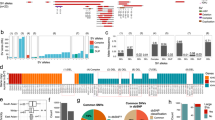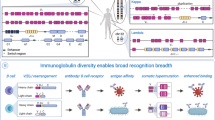Abstract
Studies on the development of the immune response suggest that the repertoire of expressed antibody specificities is strongly influenced by antigen (reviewed in ref. 1). One way in which this influence is manifested is by a progressive increase in the affinity of antibody for antigen with time after immunization. This phenomenon, termed the ‘maturation’ of the immune response, must be due to a change in the structure of the antibody being synthesized. However, the precise nature of the changes involved and the genetic mechanisms used to produce them have not been clearly defined. We have now investigated the maturation of the immune response to the hapten 2-phenyloxazolone by mRNA sequencing of specific hybridomas. We conclude that somatic mutation of germ-line encoded genes plays a major role in the generation of antibodies with increased affinity for oxazolone with time after immunization.
This is a preview of subscription content, access via your institution
Access options
Subscribe to this journal
Receive 51 print issues and online access
$199.00 per year
only $3.90 per issue
Buy this article
- Purchase on Springer Link
- Instant access to full article PDF
Prices may be subject to local taxes which are calculated during checkout
Similar content being viewed by others
References
Siskind, G. W. & Benacerraf, B. Adv. Immun. 10, 1–50 (1969).
Tonegawa, S. Nature 302, 575–581 (1983).
Kaartinen, M., Griffiths, G. M., Markham, A. F. & Milstein, C. Nature 304, 320–324 (1983).
Max, E. E., Sidman, J. G. & Leder, P. Proc. natn. Acad. Sci. U.S.A. 76, 3450–3454 (1979).
Sakano, H., Maki, R., Kurosawa, Y., Roeder, W. & Tonegawa, S. Nature 286, 676–683 (1980).
Bothwell, A. L. M. et al. Cell 24, 625–637 (1981).
Amzel, L. M. & Poljak, R. J. A. Rev. Biochem. 48, 961–997 (1979).
Secher, D. S., Milstein, C. & Adetugbo, K. Immun. Rev. 36, 51–72 (1977).
Teillaud, J. L. et al. Science 222, 721–726 (1983).
Hooker, S. B. & Boyd, W. C. Proc. Soc. exp. Biol. Med. 47, 187–190 (1941).
Sperling, R., Francus, T. & Siskind, G. W. J. Immun. 131, 882–885 (1983).
Kabat, E. A., Wu, T. T., Bilofsky, H., Reid-Muller, M. & Perry, H. Sequences of Proteins of Immunological Interest (NIH, Bethesda, (1983).
Rudikoff, S. Contemp. Topics molec. Immun. 9, 169–209 (1983).
Siegelman, M. & Capra, J. D. Proc. natn. Acad. Sci. U.S.A. 78, 7679–7683 (1981).
Slaughter, C. A. & Capra, J. D. J. exp. Med. 158, 1615–1616 (1983).
Rocca-Serra, J. EMBO J. 2, 867–872 (1983).
Reth, M., Hämmerling, G. J. & Rajewsky, K. Eur. J. Immun. 8, 393–400 (1978).
Rodwell, J. D., Gearhart, P. J. & Karush, F. J. Immun. 130, 313–316 (1983).
Staden, R. & McLachlan, A. D. Nucleic Acids Res. 10, 141–156 (1982).
Kataoka, T., Nikaido, T., Mijata, T., Moriwaki, K. & Honjo, T. J. biol. Chem. 257, 277–285 (1982).
Kaartinen, M. et al. J. Immun. 130, 937–945 (1983).
Favaloro, J., Treisman, R. & Kamen, R. Meth. Enzy. 65, 718–729 (1980).
Parker, C. W. in Experimental Immunology 3rd edn (ed. Weir, D. M.) (Blackwell, London, 1978).
Rothstein, T. L. & Gefter, M. L. Molec. Immun. 20, 161–168 (1983).
Author information
Authors and Affiliations
Rights and permissions
About this article
Cite this article
Griffiths, G., Berek, C., Kaartinen, M. et al. Somatic mutation and the maturation of immune response to 2-phenyl oxazolone. Nature 312, 271–275 (1984). https://doi.org/10.1038/312271a0
Received:
Accepted:
Issue Date:
DOI: https://doi.org/10.1038/312271a0
This article is cited by
-
A Trade-off Between Thermostability and Binding Affinity of Anti-(4-hydroxy-3-nitrophenyl)Acetyl Antibodies During the Course of Affinity Maturation
The Protein Journal (2022)
-
Immunological memory: lessons from the past and a look to the future
Nature Reviews Immunology (2016)
-
Assessment of T-dependent and T-independent immune responses in cattle using a B cell ELISPOT assay
Veterinary Research (2012)
-
Immunological memory ≠ protective immunity
Cellular and Molecular Life Sciences (2012)
-
DNA polymerases in adaptive immunity
Nature Reviews Immunology (2008)
Comments
By submitting a comment you agree to abide by our Terms and Community Guidelines. If you find something abusive or that does not comply with our terms or guidelines please flag it as inappropriate.



